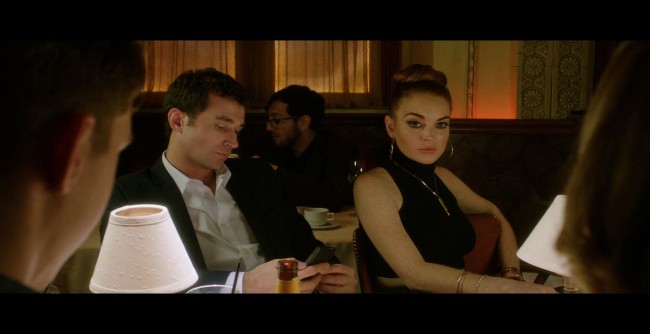The Canyons
The Canyawns

Starring: James Deen, Lindsay Lohan
Review written by Robert D. Patrick
The fang baring, salacious, psychosexual bloodletting of Bret Easton Ellis’ literary works are lumbar straining. His worlds are urban marshes of depravity and, more often than not, a decalogue of amoral drum rolls. The author’s catalog of works, beginning with his heralded debut, Less Than Zero, have all contained, in some form or another, social malaise and contempt for culture. Kids with shiny incisors and deep pockets, all parading around each other, nothing but cocaine on their face as if it were makeshift war paint.
Ellis’ model of desensitized youth has been a mainstay in films since the nineteen-eighties, when the young writer was gaining widespread acclaim in literary circles. The author has seen four of his seven books adapted for screen, American Pyscho being the most successful of which.
The Canyons, the first movie directly written for the screen by Ellis, doesn’t stray from the resolute madness of young people in America. In typical fashion, the Los Angeles born author takes aim at the bloviated nature of glass eyed twenty-somethings. Directing Ellis’ screenplay is Paul Schrader, a man whose oeuvre doesn’t shy away from bared flesh and the molting of clothes. On his resume, American Gigolo and Autofocus, if you need a dowsing rod to find his tastes.
In The Canyons, Los Angeles’ bones are picked clean by the buzzards of erroneous decisions and total neglect. The snakeskin of dreams is left behind, and Schrader wants to be your tour guide. Think Sodom and Gomorrah. Or Dante’s Inferno. Who would want to live here?
Christian (James Deen) is a vile narcissist with the tongue of a viper. He is a movie producer that subconsciously flicks keys on his phone as if they were worry beads. Christian’s girlfriend, Tara (Lindsay Lohan), is a seemingly subservient cog in her boyfriend’s life. The two engage is emotional jousting when they’re not enjoying the company of strangers’ erogenous zones. Christian and Tara’s reckless lifestyle ultimately go into overdrive when some secrets are revealed. Yawn.
Social commentary and color as motif is something that Schrader waterboards his audience with. He knows what cards are in his hands, and he wants to show them to you a little too fast. Rich young people are daft and megalomaniacal! Don’t you get it? Sex, when used for malevolent purposes, is pretty bad! Am I right? Los Angeles can be pretty, pretty crazy, huh?
Maybe if the screenplay had been in the hands of gifted actors we would have a different film. Maybe if Schrader didn’t seem like he was playing the Wizard to the man behind the curtain, Bret Easton Ellis, we would have a picture with teeth. As it is, The Canyons feels curiously inept.
Deen, whose primary career is one of the phallic kind, is not particularly a good actor (not that he generally has to be). The pornographic star performs his lines as if he were reading them, off camera, to the set of a daytime soap. And sadly, though it’s been vogue to stone Lohan with catty remarks, her work isn’t exactly good in The Canyons. Earlier in her career, the actress was deft at performing. Now – and there is no joy in saying this – she looks as though she doesn’t have a concept of situational timing. Did no one give her any batting practice before the camera rolled?
Still, the vapid, shrill pulse of excess is still omnipotent in Ellis’ post-eighties sensibilities. The guttural screams of help, drowned by carnal violence, is the Greek chorus in The Canyons, as with all of the author’s works.
The problem with Paul Schrader’s film is that the dystopian themes don’t feel organic, they instead contain too many forced moments. Strange, the characters can be daft, but the direction shouldn’t be; these two things cant share the same camp.
Ellis is a good writer, Schrader a decent director. But the glowering, barbed social commentary feels stale, as if these two men, the storytellers of their generation, are trying to document one that they are not a part of. Before they could pass the torch, they have snuffed it out.
